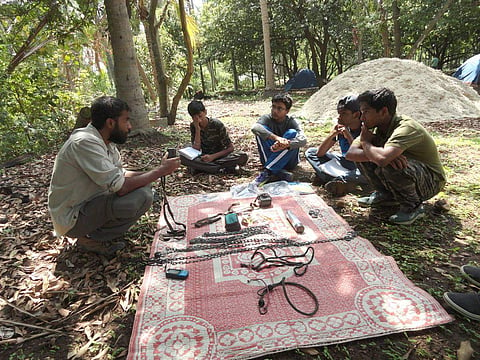

When Arun (name changed) found out that there was an illegal factory coming up near his village of T.Belalam, he immediately alerted his parents who in turn told A Rocha India, an organisation that works in the interest of wildlife especially elephants in and around Bengaluru. Such is the awareness created by A Rocha among children and farmers in the villages surrounding Bannerghatta National Park and villages that are located on the border of Karnataka and Tamil Nadu. Coming back to the story of the boy who alerted A Rocha, this information was later passed on to the forest officials of Tamil Nadu and Karnataka. They visited the spot and ensured that the factory was shut. Avinash Krishnan who is a Senior Research Officer at A Rocha India, says, "Our programmes at schools are dedicated to creating awareness about elephants and the importance of co-existence. We work with nine government schools that are mostly located in villages close to the elephant corridors. When I speak about creating awareness, we don't exactly have a curriculum. We try to conduct activities like painting, drama and so on, through which we tell them the real incidents of human-animal conflict and how it can be avoided in different situations. We also tell them about protecting animal habitats and the possibilities of threat. Hence, the villagers alert us immediately if they notice changes in the surrounding areas."
When it comes to elephants in the Bannerghatta National Park, A Rocha India is a well-known organisation. They have been working in India with its centre in Bannerghatta National Park since 2003. They have a research centre called the Kasserguppe Field Study Centre that is involved in researching about elephants, studying their behaviour and helping farmers in different ways to save their crops from being destroyed. Among all the other programmes and research work, the organisation dedicates most of its days in educating youngsters and school children. Avinash explains, "We conduct Nature Trails around the Kasserguppe Study Centre that help the participants experience the ecology surrounding Bannerghatta National Park. But all this happens with the permission of the forest department. When they go around the trails, the participants get to learn about some of the interesting traits of these mega mammals and also understand the challenges of conservation that the national park faces."
Similar to the Nature Trails, the forest department, in coordination with A Rocha, organises a programme called Rural Environment Education. "If elephant corridors have to be protected, villagers, children and the forest department play an important role. We educate children about the importance of these corridors and how they facilitate the movement of elephant families. Rather than talking about big topics like climate change, we tell them only about Bannerghatta National Park and preserving the local ecosystem because it is these kids who are exposed to most of the problems. Not just the kids at government schools, we work closely with urban school kids too as Bengaluru is a metropolitan city. We have a group called Bangaloreans of Bannerghatta where people from different walks of life contribute their expertise to A Rocha. We also educate communities and this has helped us reduce the death of humans and animals by avoiding conflicts. In case of the forest department, we provide them with technical support by installing cameras and sensors to collect data on the population of elephants and analyse their behaviour and poaching incidents. Currently, there are 160 elephants in Bannerghatta National Park and 499 elephants in the Cauvery North Wildlife Sanctuary" says Avinash.
When Avinash says that the deaths due to human-animal conflict have reduced, he means it. With the interference of A Rocha, the number of human deaths has reduced from 14 to 2 or 3 per year in the surrounding villages of Bannerghatta National Park. "Apart from being involved in the research work, we ensure that elephants or animals remain in the forest area by installing structural barriers. With Bannerghatta being a fragmented forest, we need to address the threats that these animals face in terms of encroachments or buildings by bringing changes at the policy level. Therefore, we act as the eyes and ears of the government by alerting them about the threats." Not just educating kids about elephants, they organise birdwatching sessions around the research centre as well, as the place is home to more than 80 different species of birds. If kids stand on a tree platform, then they can leisurely watch and hear them produce different sounds.
Why only children when teachers must also be trained? A Rocha ensures that they train teachers in the school too through their Train the Trainers programme. "Teachers who teach Life Sciences are part of this training programme. We provide them with the latest on-field developments so that they can combine that with the textbook content and teach it to the kids at school. So far, at least 20-25 have been benefitted from our programme," adds Avinash who believes that conservation doesn't happen overnight. It is a slow and steady process that changes over many years.
